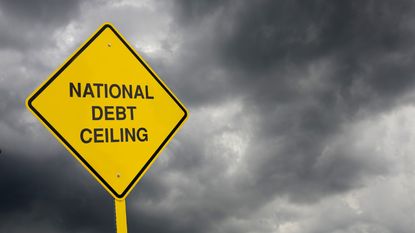Debt Ceiling Crisis: What the Experts Are Saying
A failure to suspend or raise the debt ceiling would have catastrophic consequences, the pros say.


A deal on the debt ceiling is coming into focus in Washington, and you can practically hear market participants breathing a deep sigh of relief.
Speaker Kevin McCarthy issued his most optimistic remarks to date early Thursday, saying he expects the House to consider an agreement on the federal debt limit next week. With the government forecast to run out of money as early as June 1 – or what the Treasury calls "X" date – time is rapidly running out for the White House and Congress to avert a historical catastrophe.
Removing the overhang of the looming debt ceiling crisis would hardly usher in an era of sunshine and rainbows for equity investors, experts say. But it would strike the most serious and pressing danger off a long list of market concerns. After all, investors and traders are eager to get back to nurturing their surfeit of anxieties about other things.

Sign up for Kiplinger’s Free E-Newsletters
Profit and prosper with the best of expert advice on investing, taxes, retirement, personal finance and more - straight to your e-mail.
Profit and prosper with the best of expert advice - straight to your e-mail.
For one, inflation remains too high, especially when measuring so-called core inflation, which excludes volatile food and energy prices. That's partly because the jobs market refuses to bend to the will of the Federal Reserve's most aggressive campaign of interest rate increases in four decades. And although the central bank has left the door open to a pause on rate hikes at the next Fed meeting, another quarter-point increase is by no means out of the question.
As of May 18, interest rate traders assigned a 32% probability to the Fed lifting the short-term federal funds rate by 25 basis points, or 0.25%, at its June meeting. That's up sharply from just a week ago, when the odds of a quarter-point hike were only 11%. Of course, a failure to suspend or raise the debt ceiling would throw all those bets out the window.
With Washington inching ever closer to a deal on the debt ceiling, we thought it a good time to check in with economists, strategists and other experts to get their takes on what the crisis means for markets and macroeconomics going forward. Below please find a selection of their commentary, sometimes edited for clarity or brevity.
Expert takes on the debt ceiling crisis

"It seems like the markets just can't get away from the never-ending drama in Washington, D.C. Because Congress has always ended up raising the debt ceiling in the past, the debate has come to be seen as political brinkmanship rather than a serious issue. Yields for short-term Treasuries maturing in the next few months are elevated compared to those maturing in the third quarter, as investors shy away from the risk that the interest on T-bills could be deferred – i.e., a 'technical default.' The standoff also has heightened the uncertainty about the economy. A default would risk sending short-term yields higher, while riskier assets and the dollar would likely fall. This is the scenario that played out in the 2011 debt ceiling fight, which resulted in the U.S. federal government credit rating being downgraded by several rating agencies for the first time ever." – Liz Ann Sonders, chief investment strategist at Charles Schwab
"We see roughly a 60% probability of a short-term extension pushing X date to September 30 or slightly beyond; a 30% probability of a resolution by early June; an 8% probability of no action by Congress resulting in Biden invoking the use of the 14th amendment; and a 2% probability of an outright Treasury default." – Steven Zeng, U.S. rates strategist at Deutsche Bank
"We'd like to stress this is not the base case and we fully expect cooler heads to prevail, but should the U.S. default on its debt (meaning they miss a bond payment to holders of Treasurys) the chances greatly increase of much higher interest rates, a likely recession and extreme market volatility. Many investors remember back in the summer of 2011 when both sides had trouble agreeing on a new debt ceiling and S&P downgraded the debt on the U.S., causing nearly a 19% decline in the S&P 500 over the following week." – Ryan Detrick, chief market strategist at Carson Group
"We believe the U.S. debt default risk to be low. Historically, lawmakers have managed to avoid a default on the federal debt, despite having reached the debt ceiling 78 times since 1960. We believe the government has strong incentives to reach resolution on the debt ceiling, although it may not happen until the 11th hour. For long-term investors, we prefer a defensive allocation approach that looks through what could be a volatile summer." – Wells Fargo Investment Institute
"Firstly, I think debt default is a very low probability, even if there is no deal on raising the debt ceiling. The Treasury will prioritize coupon and bond maturity payments above almost anything else, they will stop payments to other things first. It will be more like a government shutdown with federal employees furloughed, services (e.g. U.S. postal service) not working because they can't pay them to work. This hits growth primarily and will make any slowdown much worse and almost certainly tip the U.S. into recession. I actually think this might be a worse outcome because we may get to X date without an agreement, and there is no default, bonds get paid, people shrug it off, but then you get a slow strangulation of the economy, politicians will try and blame the other side for the consequences and could drag on for months." – Clive Ponsonby, currency fellow at Hedder
"The debt ceiling impasse remains the biggest recessionary threat by far." – Curt Long, chief economist at the National Association of Federally-Insured Credit Unions
"A bigger concern we have for the markets in the months ahead would be potential liquidity issues as a function of the current debt ceiling standoff. Regardless of how this political impasse ultimately concludes, it is understood that the Treasury will still need to replenish its cash positions in order to pay obligations. It will likely accomplish this through significant T-bill sales, with one estimate putting the amount over $1 trillion by the end of Q3. Such a development could drain liquidity from the banking sector, as well as raise short-term funding rates. With the U.S. economy still teetering on recession, such a potential drain on liquidity could dampen risk appetite further over the near-term, leading to elevated volatility as we move toward the second half of the year." – Dan Wantrobski, technical strategist and associate director of research at Janney
"Half-way through May, global markets are holding firm and 'climbing the wall of worry,' as banking worries appear less concerning than we initially anticipated. That said, a plausible catalyst for growth and equity market downside is the looming U.S. debt ceiling, still a potential event for June." – Caesar Maasry, head of emerging markets cross asset research at Goldman Sachs
"We have learned from past debt limit impasses that waiting until the last minute to suspend or increase the debt limit can cause serious harm to business and consumer confidence, raise short-term borrowing costs for taxpayers and negatively impact the credit rating of the United States. If Congress fails to increase the debt limit, it would cause severe hardship to American families, harm our global leadership position and raise questions about our ability to defend our national security interests." – Janet Yellen, U.S. Secretary of the Treasury, in a May 15 letter to Congress

Dan Burrows is Kiplinger's senior investing writer, having joined the august publication full time in 2016.
A long-time financial journalist, Dan is a veteran of SmartMoney, MarketWatch, CBS MoneyWatch, InvestorPlace and DailyFinance. He has written for The Wall Street Journal, Bloomberg, Consumer Reports, Senior Executive and Boston magazine, and his stories have appeared in the New York Daily News, the San Jose Mercury News and Investor's Business Daily, among other publications. As a senior writer at AOL's DailyFinance, Dan reported market news from the floor of the New York Stock Exchange and hosted a weekly video segment on equities.
In his current role at Kiplinger, Dan writes about equities, fixed income, currencies, commodities, funds, macroeconomics, demographics, real estate, cost of living indexes and more.
-
-
 What’s in DeSantis’ $1.3 Billion Florida Tax Relief Bill?
What’s in DeSantis’ $1.3 Billion Florida Tax Relief Bill?DeSantis' $1.3 billion tax relief bill extends sales tax holidays and makes other tax cuts. Here's what you can buy tax-free — and when.
By Katelyn Washington • Published
-
 Letter from the Senior Digital Editor: Celebrating Pride
Letter from the Senior Digital Editor: Celebrating PrideKiplinger senior digital editor Alexandra Svokos writes at the start of Pride Month.
By Alexandra Svokos • Published

